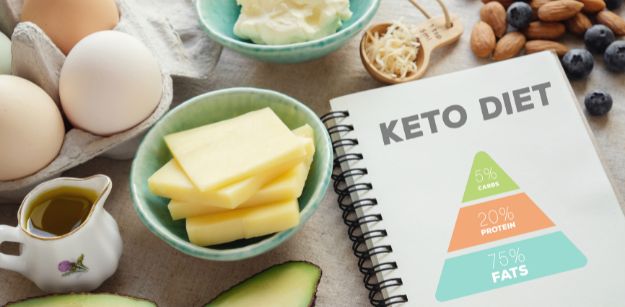The Keto diet is not a newfound concept, but it has taken the internet by storm in recent years. It has become one of those trending diets that guarantee quick weight loss, but there’s a lot more to it. It is important to know about all the details and side effects before you dive into a diet. Do not believe all the stuff people say or think that a diet will work for you because it did wonders for someone you know. It is important to do your own research and use common sense; consulting a nutritionist or certified Keto expert is recommended.
You may have heard mixed reviews and opinions about Keto, thus it is time that you discover the truth. Medical research has linked the ketogenic diet to a number of health benefits apart from weight loss. Apparently, it has shown improvement in patients suffering from autoimmune diseases and mental decline. Some studies suggest that it can prevent cancer and slow down the development of Alzheimer’s.


Before we dive into debunking myths surrounding Keto, we should understand what this diet entails. The ketogenic diet is a high-fat diet, in which consumption of carbohydrates is reduced drastically. On average, about 40-70% of calories consumed by a person per day come from carbohydrates. When you’re on the Keto diet, around 70% of your daily calories come from fat, about 20% from protein, and no more than 10% from carbohydrates. Since it’s a low carb diet, many people compare it to the Atkins diet that is a protein-rich diet.
Our bodies are accustomed to breaking down carbohydrates for energy, but when the intake of carbs is significantly reduced, the body is pushed into a metabolic state called ‘ketosis’. Under ketosis, the body utilizes fat for energy in place of carbs. The phenomenon makes the body efficient at burning fat, which translates into remarkable weight loss. Even though Keto certainly works if done right, it is not suitable for everyone. If you are planning to go on this diet, learn the facts and clear the misconceptions first.
1. Keto is an on-and-off diet for weight loss
Unfortunately, the ketogenic diet is not one those fad diets that you can get into for a few days and then go back to a normal diet. Keto is more of a lifestyle, as opposed to a temporary diet for immediate weight loss. If you only do it for a day or week and then discontinue, it won’t work; in fact, you might end up gaining weight rather than losing if you keep that up. This is a restrictive diet that needs long-term dedication and devotion. If you cannot give up your favorite carbs, this diet is not for you.
2. You can eat all the saturated fats and protein you want
The Keto diet is not the same at the Atkins diet, and neither does it give a free pass to consume unlimited amounts of bacon and butter. Many people think that they can eat unrestricted amounts of eggs and proteins on Keto, which is totally incorrect. Too much eggs and meat will create an excess of proteins rather than fats. The excess protein will be converted to glucose that will spike blood sugar levels and eliminate the state of ketosis.
You should refer to the ketogenic diet chart for beginners, rather than devising appropriate meals by yourself. The Keto diet promotes consumption of unsaturated fats, whereas saturated fats should be kept to a minimum. Butter and bacon contain high amounts of saturated fat, which can elevate your cholesterol levels and cause cardiovascular problems if consumed excessively. The top three foods to eat while on this diet include fatty fish, nuts, and avocadoes; the best dairy products you can enjoy include Cheese and Greek Yogurt.
It is also important to eat fresh produce (low-carb fruits and vegetables) on this diet because your body needs its daily dose of fiber and vitamins. If processed fats is all you eat, you are likely to remain constipated all the time.
3. Keto is bad for physical and mental health
The ketogenic diet is safe and healthy, as long as you follow all the rules. It has numerous health benefits, given that you follow it through. Nonetheless, it does have some side effects like any other diet, though none of them will endanger your wellbeing. Keto changes our internal mechanism of yielding energy, which is why it takes some time for the body to get used to it. You might feel fatigued, parched, and lightheaded all the time during the initial phase; unexplainable hunger cravings are also a common symptom.
However, all these downsides are eventually overcome if you keep your diet balanced and stay hydrated. Drink a lot of water, consume a fair amount of fiber and vitamins, avoid saturated fats, as well as try fasting. Intervals of fasting during the ketogenic routine improves the body’s metabolism and accelerates weight loss. During ketosis, the body converts fats into ketones, which are known to nourish the brain. The caloric restriction of this diet has helped many diabetics regulate blood sugar and patients of auto-immune disease are able to beat inflammatory issues.
4. Ketosis and Ketoacidosis are the same thing
Ketoacidosis is a condition that has been observed in Diabetics, which results from very high levels of ketones and blood sugar. This happens when the body is not receiving sufficient levels of insulin, and causes the blood to become overly acidic. The high acidity of the blood can damage organs, which is why this ketoacidosis is life-threatening.
Ketosis is nothing like ketoacidosis, contrary to popular belief. Ketosis is a metabolic process that triggers break down of body fat and muscle in the absence of glucose that is manufactured from carbohydrates.
5. Keto is not sustainable
Many individuals who went on the Keto diet briefly, argue that it is not sustainable – you cannot stay on it for long and the lost weight is regained quickly. The reason behind this argument is that these people couldn’t commit to the diet. It can be difficult to adapt to the Ketogenic lifestyle due to the strict limit on carb intake, but the benefits are everlasting once you do. Your metabolism keeps getting better with every passing day and you will notice all your untimely hunger/cravings disappear.
6. Fasting is a requirement for Keto
Fasting may enhance and fast-track certain effects of Keto, though it is not a compulsion. Fasting is never recommended to beginners anyway, since their body is still getting used to the new diet. You can eat all you want, as long as you keep the dietary proportions in check. The benefits of the ketogenic diet can be reaped with and without the fasting technique, so rest assured. That being said, periods of fasting have proven to speed up weight loss, supplement detoxification, and control hunger/cravings.
7. Keto causes Insomnia
Any claims regarding loss of sleep from the ketogenic diet are baseless and nonsensical. Truth is, people who replace a high-carb diet with a high-fat or high-protein are able so sleep better. The fat-rich diet promotes deep sleep, so you are likely to wake up progressively refreshed and rejuvenated in the morning. Some people experience more frequent urination during the starting days of the diet, which could be the reason for interrupted sleep; otherwise, there is no connection between Keto and insomnia.
8. Alcohol is off the table
Alcoholic drinks are known to contain a high carb content, so it not surprising to think that Keto will prohibit your indulgence. While conventional wines and beers are surely laden with carbs, many dry wines, liquors, and light beers contain very low to zero carbs. Therefore, you will need to be more conscious of what you drink and drink less than you normally do. Bear in mind that the lack of carbohydrates in your system will reduce your tolerance for alcohol. Do not drive if you choose to have a drink, or you might need to hire a DUI Defense Attorney the next day.
9. You cannot exercise or workout
When you have just started your Keto journey, it is normal to feel tired/drained of energy while the body is developing and getting used to ketosis. For that reason, you should refrain from exerting yourself too much. You can still participate in low-impact exercises, but the heavier stuff should be saved for later (ideally, after a few weeks). Once you are accustomed to the Keto lifestyle, you can go back to your routinely workout. Exercising with the ketogenic diet helps burn 2-3 times more fat, and your body gains more strength. It is important to fuel up with sufficient Keto-approved calories to sustain your workouts.
10. The Keto diet is void of Fruits and Vegetables
You may have to exclude carbohydrate-rich fruits and vegetables from your diet, but you should never abandon fresh produce. Fruits and vegetables are important to supply your body with necessary vitamins, antioxidants, and fiber. Keto-friendly vegetables include spinach, tomatoes, lettuce, cucumber, zucchini, mushrooms, and celery. Keto-friendly fruits include avocado, lemons, berries (blue berries, strawberries, and raspberries), kiwi, and plum. All the mentioned fruits and vegetables contain less than 5% carb content, which makes them ideal for the ketogenic lifestyle.



